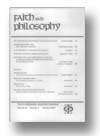|
articles |
|
1.
|
Faith and Philosophy:
Volume >
24 >
Issue: 4
Merold Westphal
The Importance of Mystery for the Life of Faith
abstract |
view |
rights & permissions
| cited by
That the life of Christian faith needs to understand itself as dwelling in the realm of mystery, of that which exceeds and overwhelms any languageand concepts with which we seek to understand it, is suggested at three sites in continental philosophy of religion: Heidegger’s critique of ontotheology,Marcel’s distinction between problems and mysteries, and Marion’s distinction between idol and icon, along with his account of the saturatedphenomenon. All three see the category of mystery as much wider than its religious usage but as crucial for a proper understanding and practice ofChristian faith.
|
|
|
|
|
2.
|
Faith and Philosophy:
Volume >
24 >
Issue: 4
Derek Malone-France
LIBERALISM, FAITH, AND THE VIRTUE OF ‘ANXIETY’
abstract |
view |
rights & permissions
| cited by
I argue for a re-appropriation of the religious/philosophical concept of ‘anxiety’ regarding human finitude and fallibility as an ‘epistemic virtue’ thatshould frame the relationship between personal (including religious) belief and political participation and procedures. I contend that moral justificationsof liberal norms based on ‘respect for persons’ and ‘tolerance’ are insufficient without relation to such a (complementary) epistemic basis. Furthermore, Iargue that a careful examination of the internal logic of religious belief, per se, undermines traditional understandings of ‘faith’ (as being categoricallyopposed to ‘doubt’) and reveals support for liberal norms as an necessary implication thereof.
|
|
|
|
|
3.
|
Faith and Philosophy:
Volume >
24 >
Issue: 4
Eric Reitan
A GUARANTEE OF UNIVERSAL SALVATION?
abstract |
view |
rights & permissions
| cited by
Recent defenders of the Christian doctrine of eternal damnation have appealed to what I call the “No Guarantee Doctrine” (NG)—the doctrine that not evenGod can ensure both (a) that every person who is saved freely chooses to be saved and (b) that all are saved. Thomas Talbott challenges NG on the groundsthat anyone who is truly free will have no motive to reject God and will infallibly choose salvation. In response to critics of Talbott , I argue that in order toavoid Talbott ’s critique of NG, its defenders must adopt a view of human freedom in which there is a random element in choice. And if free choice involvessuch an element, then it is within God’s power to achieve a mathematical guarantee of freely chosen salvation for all. Thus, NG must be rejected.
|
|
|
|
|
4.
|
Faith and Philosophy:
Volume >
24 >
Issue: 4
Alexander R. Pruss
PROPHECY WITHOUT MIDDLE KNOWLEDGE
abstract |
view |
rights & permissions
| cited by
While it might seem prima facie plausible that divine foreknowledge is all that is needed for prophecy, this seems incorrect. To issue a prophecy, God hasto know not just how someone will act, but how someone would act were the prophecy issued. This makes some think that Middle Knowledge is required.I argue that Thomas Flint’s two Middle Knowledge based accounts of prophecy are unsatisfactory, but one of them can be repaired. However the resources needed for repair also yield a sketch of a foreknowledge-only account of prophecy.
|
|
|
|
|
5.
|
Faith and Philosophy:
Volume >
24 >
Issue: 4
John Martin Fischer, Neal A. Tognazzini
Exploring Evil and Philosophical Failure:
A Critical Notice of Peter Van Inwagen's The Problem of Evil
abstract |
view |
rights & permissions
| cited by
In his recent book on the problem of evil, Peter van Inwagen argues that both the global and local arguments from evil are failures. In this paper, we engagevan Inwagen’s book at two main points. First, we consider his understanding of what it takes for a philosophical argument to succeed. We argue that whilehis criterion for success is interesting and helpful, there is good reason to think it is too stringent. Second, we consider his responses to the global andlocal arguments from evil. We argue that although van Inwagen may have adequately responded to each of these arguments, his discussion points us toa third argument from evil to which he has yet to provide a response.
|
|
|
|
|
reviews |
|
6.
|
Faith and Philosophy:
Volume >
24 >
Issue: 4
Timothy Chappell
Jonathan Kvanvig: The Value of Knowledge and the Pursuit of Understanding
view |
rights & permissions
| cited by
|
|
|
|
|
7.
|
Faith and Philosophy:
Volume >
24 >
Issue: 4
Sarah Borden
Brian Davies and Brian Leftow: The Cambridge Companion to Anselm
view |
rights & permissions
| cited by
|
|
|
|
|
8.
|
Faith and Philosophy:
Volume >
24 >
Issue: 4
John Kronen
Richard Cross: Duns Scotus on God
view |
rights & permissions
| cited by
|
|
|
|
|
9.
|
Faith and Philosophy:
Volume >
24 >
Issue: 4
Todd C. Ream, Thomas W. Seat II
Jean-Pierre Torrell and Benedict M. Guevin: Aquinas’s Summa:
Background, Structure, & Reception
view |
rights & permissions
| cited by
|
|
|
|
